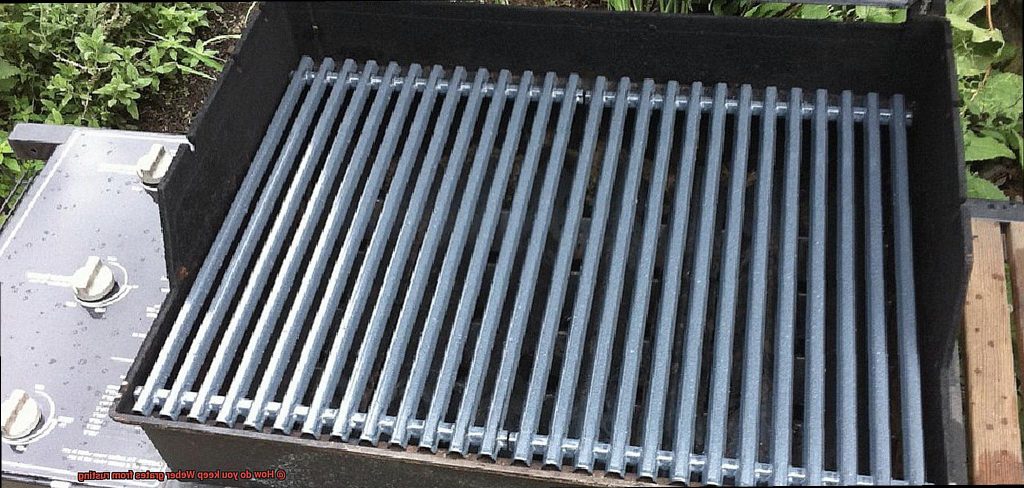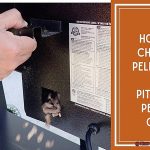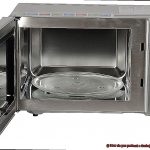Are you tired of seeing your Weber grill grates turn into a rusted mess? Don’t let that happen to your beloved grill that has been passed down from generation to generation or the one you’ve invested in. Keeping those grates looking and working like new is easier than you might think.
Seasoning your Weber grates is an essential step in preventing rust. A good seasoning creates a natural non-stick surface that protects the grates from moisture and rust buildup. And don’t forget about regular cleaning and maintenance of your grill. Leaving food and grease on the grates can lead to rust and corrosion over time.
But what about when you’re not using your grill? Proper storage is key, especially in humid or moist climates. Consider purchasing a grill cover or building a shelter to protect your grill from the elements. This will keep it looking like new for years to come.
Lastly, using a rust-resistant material like stainless steel or cast iron for replacement grates can prevent rust from developing in the first place. So if you need to replace your old, rusty grates, consider upgrading to these materials.
By following these simple tips, you can ensure that your Weber grates stay in great condition and provide delicious grilled meals for many summers to come.
Contents
Why is it Important to Keep Weber Grates from Rusting?
Not only can rust be unsightly, but it can also pose serious risks to your health and the taste of your food. Let’s explore why it’s so crucial to keep those grates rust-free.
Structural Integrity
Rust is a common problem that occurs when iron or steel is exposed to moisture and oxygen. When rust forms on Weber grates, it can cause them to weaken and become brittle. This makes them more susceptible to cracks and breakage, which can be hazardous when cooking. The weakened grates may not be able to support the weight of the food being cooked, causing it to fall through the grates and potentially causing injury.
Taste of Food
In addition to compromising the structural integrity of your Weber grates, rust can also affect the taste of your food. When rust forms on the grates, it can create an unpleasant metallic taste that can ruin the flavor of the food. This is especially true for acidic foods like tomatoes or citrus fruits. So not only does rust make your grates less safe, but it also makes your food less enjoyable.
Hygiene
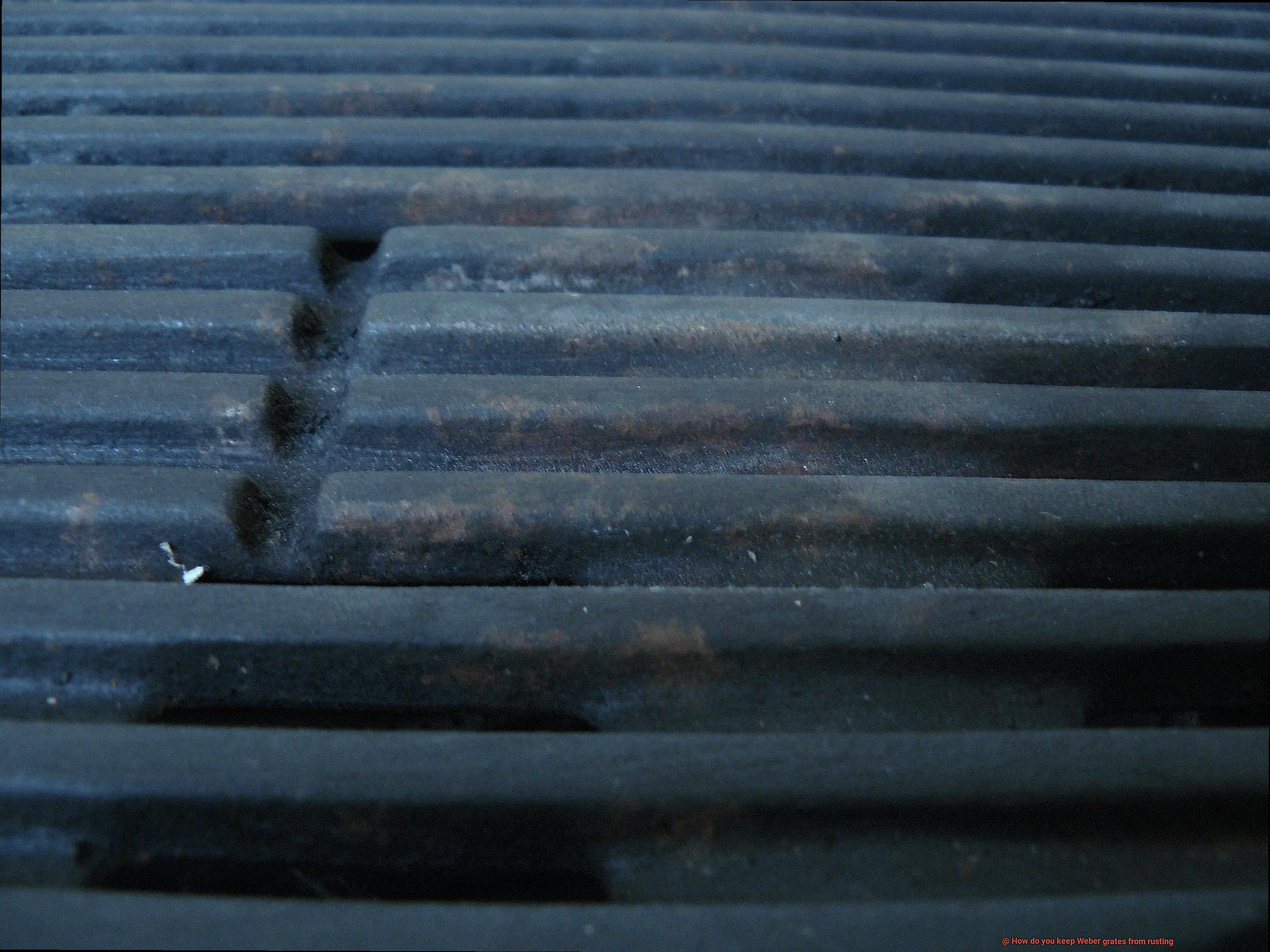
Rust can also compromise the hygiene of your Weber grates. The buildup of rust on the grates can harbor harmful bacteria that can cause food poisoning and other health issues. It’s crucial to keep your grates clean and free from any rust buildup to ensure that you’re cooking with safe, healthy equipment.
Prevention and Removal
To prevent rust from forming on your Weber grates, you should clean them thoroughly after each use and keep them dry. Seasoning your grates with oil before cooking also creates a protective layer that helps prevent rust formation. If rust has already formed, there are several methods you can use to remove it, including scrubbing with a wire brush or soaking in a vinegar and water mixture.
How to Prevent Rust on Weber Grates
Not only can rust make your grill look unsightly, but it can also impact the flavor of the food you cook. Luckily, there are several easy steps you can take to prevent rust from forming on your Weber grates and keep your grill in top condition.
Keep Your Grates Clean and Dry
The first step in preventing rust is to keep your grates clean and dry. After each use, remove any leftover food debris and ash using a grill brush or scraper. Then, wipe down the grates with a damp cloth and allow them to air dry completely before putting the cover back on the grill. Moisture is one of the main causes of rust, so it’s important to ensure that your grates are thoroughly dry before storing them.
Apply a Protective Coating
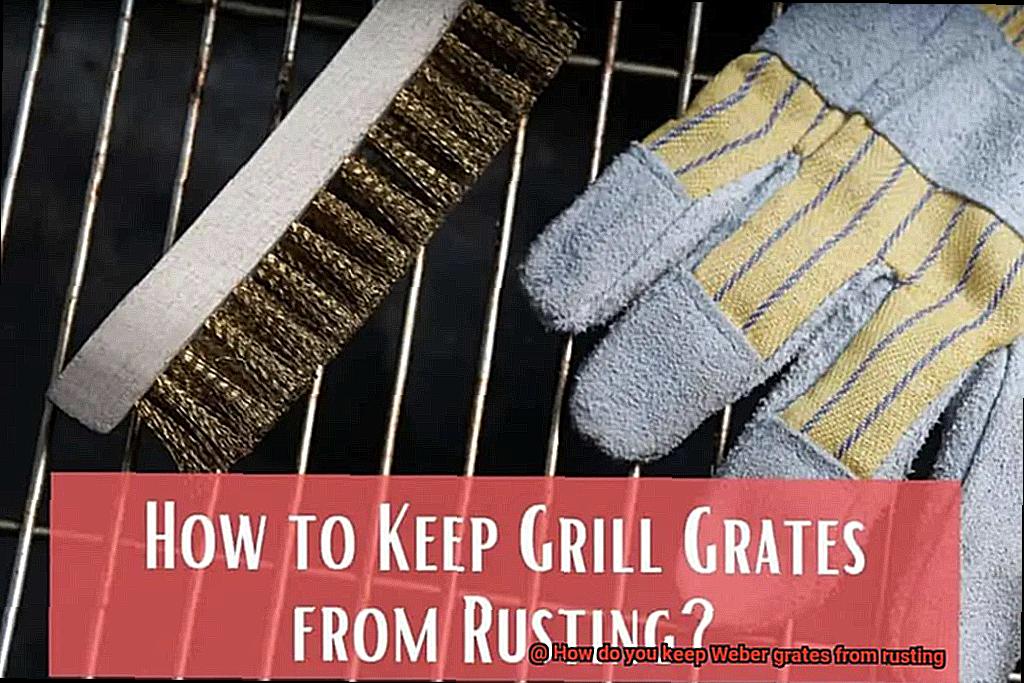
Another effective way to prevent rust is to apply a layer of oil, cooking spray, or specialized grill protectant to the grates after cleaning. These coatings create a barrier between the metal and moisture, preventing rust from forming. However, be careful not to use too much oil as excess oil can cause flare-ups when cooking.
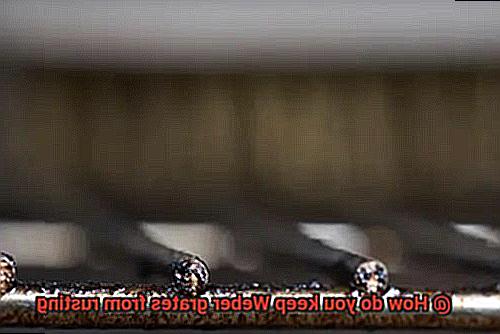
Season Your Grates
Seasoning your grates is another effective method for preventing rust. This involves applying a layer of oil to the grates and heating them up to high temperatures. The process creates a non-stick surface on the grates and prevents moisture from penetrating the metal. To season your grates, brush them with oil and preheat the grill to 400-450 degrees Fahrenheit. Place the grates on the grill and let them heat up for at least 30 minutes.
Store Your Grill in a Dry Place
If you plan on leaving your grill unused for an extended period, it’s recommended to store it in a dry place, preferably indoors. If storing the grill outside is necessary, invest in a high-quality grill cover that will protect the entire unit from moisture and other environmental factors. A cover can also help protect your grill from debris and pests.
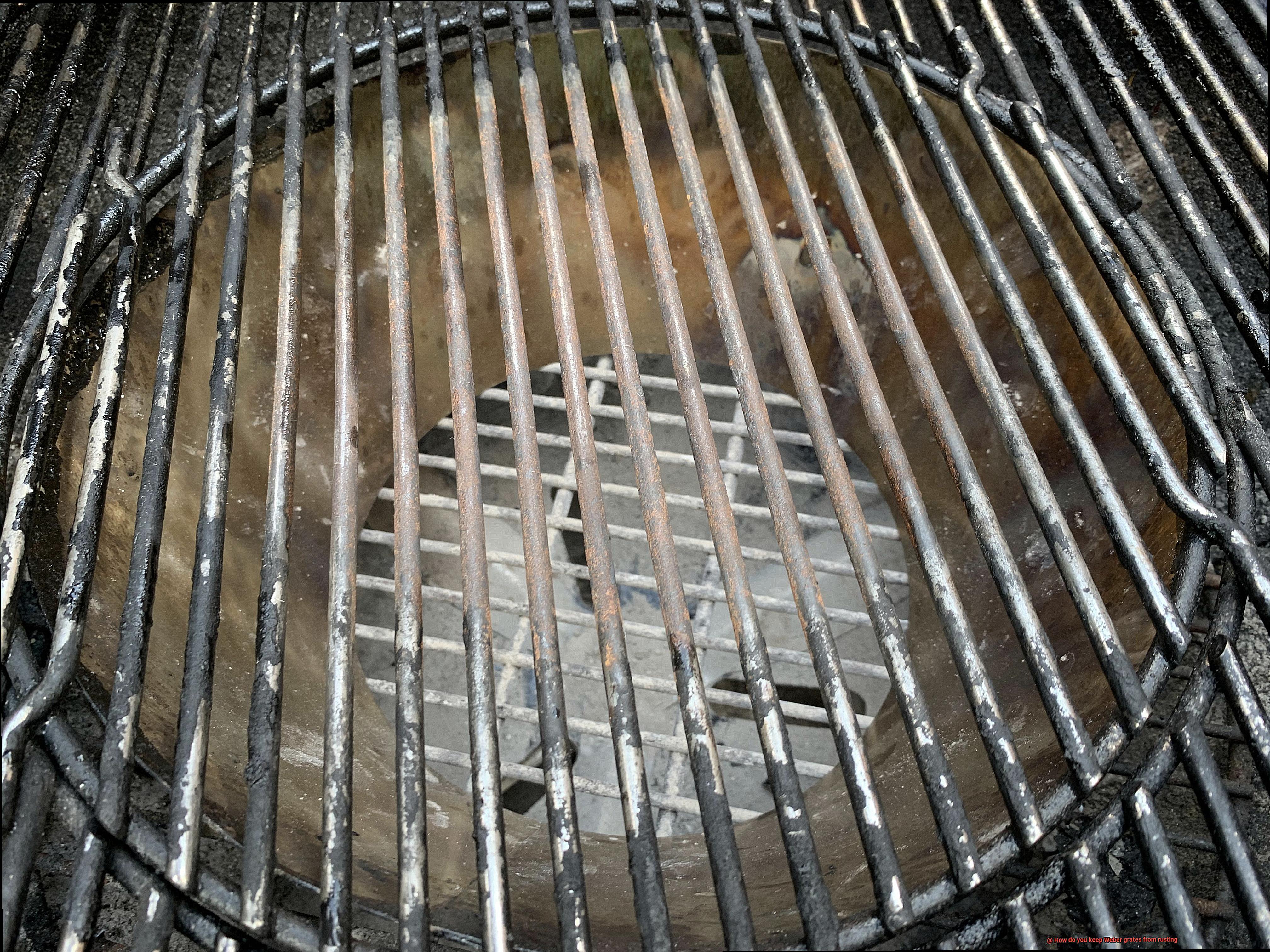
Invest in Stainless Steel or Porcelain-Coated Grates
Finally, consider investing in stainless steel or porcelain-coated grates as they are less prone to rust than traditional cast iron grates. While they may be more expensive initially, they will save you money in the long run by reducing the need for replacement parts due to rust damage. These types of grates are also easier to clean and maintain.
Clean and Dry After Each Use
This simple step is essential for preventing rust from forming on your grates. Any food particles, grease, or debris left on them can cause corrosion over time, diminishing the quality of your cooking.
To clean your Weber grates, remove them from the grill and use a wire brush or scraper to remove any remaining food particles. A solution of warm water and dish soap can help loosen stubborn dirt or grease. Rinse the grates thoroughly with clean water and dry them with a clean towel.
It’s crucial to make sure that your grates are completely dry before storing them away. Even a small amount of moisture can cause rust to form on the metal surface. To speed up the drying process, you can use a towel or air-dry the grates in a warm, dry place.
Additionally, periodically seasoning your grates with oil helps create a protective layer that prevents rust formation. Brush your grates with a light coating of vegetable oil and heat them on the grill for 15-20 minutes before letting them cool down completely.
Season Your Weber Grates with Oil
As grilling season heats up, ensuring your Weber grill grates are well-maintained is crucial to achieving that perfect sear. One effective method for keeping your grates rust-free and non-stick is through seasoning them with oil. This process involves coating the grates with a thin layer of oil to create a barrier between the metal and the elements, as well as avoiding food from sticking during grilling.
To start, ensure your grates are clean by using a wire brush or scraper to remove any debris or rust. Next, grab a paper towel or basting brush and apply a thin layer of high-heat cooking oil, such as vegetable or canola oil, to the grates. It’s important to coat the entire surface of the grates, including the sides and corners, to prevent rusting.
After applying the oil, preheat your grill on high for about 15 minutes to allow the oil to bond with the metal. This creates a non-stick surface that makes it easier to grill your food and prevents it from sticking to the grates. Once preheating is complete, turn off the burners and let the grill cool down entirely before using it.
It’s worth noting that you only need to season your Weber grates once before using them for the first time. Nevertheless, consider re-seasoning them periodically throughout the grilling season to maintain their non-stick surface and prevent rusting.
Beyond preventing rusting, seasoning your Weber grates with oil can also enhance the flavor of your grilled foods. The oil will absorb some of the flavors from previous grilling sessions and impart them onto your food during subsequent grilling sessions.
Removing Existing Rust from Weber Grates
As a grill master, you want your Weber grates to be in tip-top condition before firing up the grill. Rust spots can be an eyesore and could potentially affect the taste of your food. But don’t worry, removing existing rust from your Weber grates is a straightforward process that will have them looking like new again.
To start, carefully inspect your grates for any signs of rust. If you spot rust, it’s time to roll up your sleeves and get to work. Here are three effective ways to remove rust from your Weber grates:
Wire Brush: For light rust spots, a wire brush or grill brush is perfect. When the grates are cold and dry, use a stiff-bristled wire brush to scrub away any rust from the surface of the grates. Be sure to get into all the nooks and crannies of the grate to ensure all rust is removed.
Vinegar Solution: A vinegar solution can be used for more severe rust spots. Mix equal parts of white vinegar and water in a spray bottle and spray it onto the rusted areas of the grates. Allow the solution to sit for 10-15 minutes before scrubbing with a wire brush. Rinse thoroughly with water and dry completely.
Baking Soda Paste: Another option is to use baking soda and water to create a paste. Apply the paste to the rusted areas and let it sit for about 30 minutes before scrubbing with a wire brush. Rinse thoroughly with water and dry completely.
Once you have removed all the rust from your Weber grates, it’s crucial to season them properly. Seasoning involves coating the grates with oil and heating them on high heat for about 15-20 minutes. This will help protect them from future rusting.
Using a Wire Brush or Steel Wool
After cooking, cleaning the grates is essential to avoid rusting and maintain hygiene standards.
Let’s start with wire brushes. It is important to choose one with sturdy bristles that won’t break off and get stuck in the grates. The last thing you want is for your guests to find metal pieces in their burgers. Using the brush correctly is also important; applying enough pressure to remove debris, but not so much that the bristles damage the grates.
Steel wool is another option for cleaning Weber grates. But be sure to use fine-grade steel wool and avoid coarse-grade, which can damage the grates. Additionally, protect your hands by wearing gloves to avoid any sharp edges of steel fibers.
After using either a wire brush or steel wool, it’s important to wipe down the grates with a clean cloth or paper towel to remove any remaining debris. This step prevents leftover food particles from attracting moisture and causing rust.
Soaking the Grates in Vinegar and Water
Grilling is a beloved pastime, but rust on your Weber grates can take away from the experience. Fear not, as there is an easy and cost-effective solution: soaking the grates in vinegar and water.
But why vinegar and water? The acidity of vinegar helps break down rust and corrosion on the grates, while water dilutes the vinegar to prevent damage to the metal. To start, remove the grates from your grill and place them in a spacious container or sink. In a separate container, mix equal parts white vinegar and water and pour it over the grates until they are fully submerged. Let them soak for at least an hour or longer for more stubborn rust.
After soaking, scrub away any remaining rust or debris with a brush or sponge. Thoroughly rinse the grates with water and dry them completely before returning them to your grill. Keep in mind that vinegar can be corrosive to some types of metal, so check your grill’s manual or manufacturer’s instructions before using this method.
Regular maintenance and proper care will keep your Weber grill in excellent condition for years of outdoor cooking enjoyment. So don’t let rust get in the way of your grilling experience – give vinegar and water a try and keep those grates looking like new.
tszUKQdzqLw” >
Conclusion
In conclusion, maintaining the condition of your Weber grill grates is crucial for both the longevity of your grill and the quality of your grilled food. Rust can weaken the grates, taint the flavor of your meals with an unpleasant metallic taste, and even pose a risk to your health by harboring harmful bacteria. To prevent rust from forming on your Weber grates, it’s essential to keep them clean and dry after each use. Applying a protective coating such as oil or specialized grill protectant can also be highly effective in keeping rust at bay.
Seasoning your grates with oil creates a non-stick surface that prevents moisture from penetrating the metal, which is another key factor in rust prevention. Proper storage in a dry place or investing in a high-quality grill cover is also crucial to protect your grill from moisture and other environmental factors.
If you do notice rust forming on your Weber grates, don’t panic. There are several solutions available that can help you remove it effectively. A wire brush or steel wool can work wonders in removing stubborn rust spots, while soaking them in vinegar and water or creating a baking soda paste are also effective methods.
Remember that regular maintenance and proper care are key to keeping your Weber grill grates in excellent condition for years to come.

